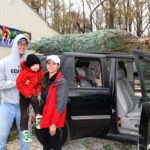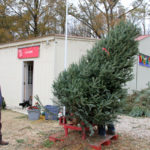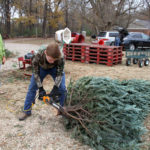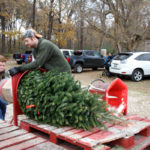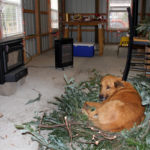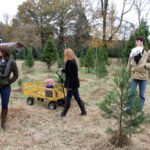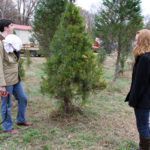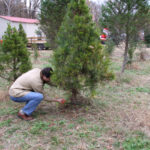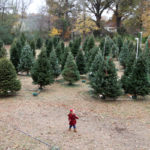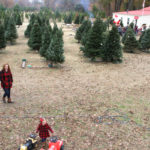Stepping out of the car at Priddy Farms in Bartlett, customers inhale deeply and say it already smells like Christmas before their shoes crunch on the gravel. The scent of cedar and pine fills the air, already laced with smoke from the campfire where children are roasting marshmallows.
The occasional chainsaw growls, and machinery whirs as employees put trees in the “shaker,” a contraption that knocks off loose needles. Other workers deftly pull trees into narrow tubes of netting to compact them before they are tied to car roofs and carted off to Mid-South homes. Kids who aren’t obediently following parents through rows of trees squeal on the farm’s rope swings or scamper through a massive wooden playhouse in the shape of a ship.
Otherwise, it’s just the crackle of the fire, the wind in the trees, and the quiet padding around of the farm’s mournful-eyed hound, Taz, looking for someone to pet him.
The people of Priddy Farms aim to please with whatever the customer needs. A customer with a Ford Focus last year made it home with a 12-foot tree. A few years back, a happy college-age customer left in a small Nissan with a his pick of a 20-footer that stuck out in every direction. The mismatch between vehicle and Christmas tree ambition is a common one.
It’s been a tradition for 18 years now for many families to pick a live tree at the 24-acre farm, owner Spencer Priddy says. He operates the Christmas tree farm and pumpkin patch and also has been a Memphis police officer for the past 14 years.
He used to take his family to a similar property in Millington every Christmas. He was 30 when those operators went out of business, and he looked at his own under-used land, researched online, and thought, “I could do this.”
Since then, he has built his business from scratch. It took him five years of importing trees before his own plantings were mature enough to be harvested.
Today, he sells a mix of imports — frasier fir, concolor fir (white fir) and blue spruce — and his own trees. He plants Virginia pines, Leland cypress and the classic Eastern red cedars that most Southerners’ grandparents used to cut for the season. Precuts start around $60 (military discounts offered), and the cut-your-own trees cost $50.
A core group of customers have been coming since his first year. One is “the canoe man,” a customer who loves to kayak and canoe, and he cuts three Priddy Farms trees every year. Priddy says he looks for him and others every season.
The people coming back are his favorite part of the work. “It’s like old family, especially when you see the same people for years and years. You may not always remember the names, but you always remember the faces.”
One employee, Tyler Flynn, is a former customer himself who started coming to Priddy’s pumpkin patch with his family when he was 5 or 6. He showed up for a job ad about three years ago and has been working there ever since then when his school schedule allows.
Priddy is proud of the young men who work for him. “They help me out, and they do a good job.”
While he talks about his people and the business he loves, a steady stream of customers come into the work shed and pay with cash and credit cards. One jokes that he picked out a 10-foot tree, but a foot got cut off it. He looks expectantly at Priddy, who assures him that he paid for that extra foot so he ought to be sure to take it with him. They laugh, and the customer opens his wallet.
People are honest to a surprising degree, Priddy says, with the realization seeming to please him. He has had customers during pumpkin season get down the road and come back to pay a forgotten $1 fee they overlooked. He’s comfortable operating on the honor system.
He tries to please customers with a wide range of services, including classes on wreath making, and his business also creates wreathes and garlands to order. For those who are picking out a live tree, he sells or provides everything a customer needs. Customers don’t even have to bring their own rope to tie the trees to their cars.
Smooth end-of-year operations require year-round planning and work, however. In January, Priddy completes the post-Christmas clean-up and plants 1,000 to 1,500 new trees, anything from small saplings to trees in three-gallon containers. By May, the trees get a spring bloom, and he trims them to a conical shape before they harden off.
Around June and July, he prepares for pumpkin season by tilling the ground, with the goal of planting around July 4.
There’s another tree bloom in mid- to late-August among the Virginia pines, so they get another trim. He recently invested in a large backpack model equipped with a trimmer about eight feet tall, angled just right so he can walk around the tree and quickly shape it. The costly purchase was worth it because it compressed his trimming time from weeks to about two days, Priddy says.
He opens his pumpkin season in late September, and then it’s a race through the busy pumpkin and tree seasons until the end of the year.
Despite the worry of farming through a drought and the responsibility of operating as an entrepreneur, Priddy takes joy in his farm.
“When you were a kid, you had that sense of fantasy and Christmas, and ever since I’ve been doing this, it feels kind of the same now. Because you’re providing joy and happiness to families, and you get to see the little kids have fun. And they get all excited and big eyed, and you’re helping them find their perfect Christmas tree and making their Christmas. I really like it.”
He adds, “Yeah, it’s work. But if you like what you’re doing, it’s not really work.”
Written by Carolyn Bahm, Express editor. Contact her at (901) 433-9138 or via email to bartlett.editor@journalinc.com.

